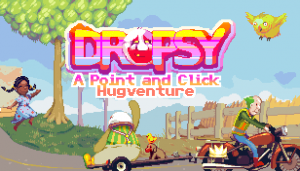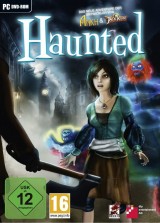Review for The Beginner’s Guide

There is a long and storied history of writers writing about writers. The same goes for films about filmmaking. Artists love talking about their art. At its best, this kind of inward-looking expression provides insight into the given medium and the creative process, giving us a glimpse of the passions and anxieties of the people who entertain and intrigue us with their work. At its worst, it becomes unrelatable navel-gazing.
Games are just beginning to play in this space, as the market and tools evolve to allow for smaller, more personal experimental games. The Stanley Parable was one of the first games to substantially break the fourth wall in order to examine the nature of choice and interactivity in games, garnering massive acclaim by mixing its insights with a dollop of charm and wit. Stanley constantly reminded players that they were playing a game, encouraging them to disobey their instincts and try to break it. Stanley was a huge success, and its previously unknown developer, Davey Wreden, was thrust into the spotlight. He was hailed as brilliant, given dozens of industry awards, and paid handsomely.
In his blog a few months after the release of the game, Wreden published a post exploring his battle with depression in the wake of the game’s triumph. While humbled and grateful for the reception of his debut, Wreden had for months been struggling with the disconnect between the validation he was receiving and his insecurities, as well as the constant demands of fans and press to have access to his life and thoughts. In his post he was very blunt about essentially becoming addicted to praise, constantly needing more effusive acclaim in order to feel like he had accomplished something worthwhile. Eventually, this and the seemingly constant intrusions of the media and his fans into his life drove him to withdraw from the public for months.
That was the last we heard from Davey Wreden for some time. Then, a year and a half after that blog, he announced a new game, called The Beginner’s Guide, developed without the help of the team he’d worked with on Stanley, to be released a mere two days later. The game came out with no pre-release hype or press coverage, slipping quietly onto Steam.
All of this background is important because The Beginner’s Guide, while fictional, is a deeply personal, nearly autobiographical work, more so than any I’ve ever played. It is presented as a collection of small, experimental games created between 2008 and 2011 by a reclusive developer named Coda, who struggled creatively with the expectations of players before finally removing himself entirely from the public eye. Sound familiar? Curating the collection and narrating the tour is Wreden himself. Wreden (as narrator) tells the player that the games were so important to him that he feels a responsibility to share them with the world.
And so you play through Coda’s games in chronological order, from his very first mod to his final opus, while Wreden narrates, recalling his personal history as a friend of Coda’s as well as his analysis and interpretation of the games. The games themselves are mostly spartan, linear affairs with lo-fi graphics, low player agency, and abstract themes, played from a first-person view using standard WASD controls and the mouse (there’s also gamepad support, which works just fine). Less shooting of monsters and more pondering the nature of loneliness while walking through massive, gloomy environments; that sort of thing. You see the progression of Coda as a developer, from early games that trade in clichés, to hastily-made thought experiments in bland environments, to mechanically-involved games in beautiful surroundings. On its own, each would be a fun little game jam project, a cute experiment that make you think and nod, going “yeah, there’s something here.” Taken together, and with Wreden’s analysis, they form a compelling narrative portrait of a creator and his number one fan.
The strength of the game is the fascinating interplay between Wreden’s musings and your own evolving interpretation of Coda’s work. The narration touches on a wide array of topics in its 90-minute run: games as art, the necessity of fun in gaming, the relationship between creator and consumer, the relationship between a creator and their work, and the motivations of creators in pursuing their work. But it’s not a matter of just taking in what Wreden’s saying. What the game seems to suggest, what Wreden says explicitly, and your own thoughts along the way will not necessarily align. In some cases, you are encouraged to approach the game in direct opposition to Wreden’s narration.
At one point you play a game that has you ascending a staircase to reach a room at the top while your movement speed decreases, eventually reaching an impossibly slow crawl. Wreden praises the inaccessibility of the game, only to give you an out – he has modified the game so that pressing a button will restore your normal move speed. Rather than taking an hour to get to the end, you can progress in seconds, undoing the original intent of the game. So which is it? Is the inaccessibility an indispensable part of the experience? Is the narrator ruining the game by modifying it? Is the real-life Wreden winking at us?
Complicating things further is the fact that the relationship between the in-game narrator and the real-life Davey Wreden is purposefully left vague – you’re left to interpret how much of the narration represents the real Wreden’s thoughts and how much are those of a fictional character. The game is verifiably fictional, yet internally it is presented as fact, with Wreden even giving out a real email address so that players can contact him with theories and information on Coda’s whereabouts.
If you’re rolling your eyes at this point, then you can probably safely walk away from The Beginner’s Guide. There’s not much in the way of gameplay outside of walking around, listening to Wreden, and occasionally pressing a switch or clicking on something. Exploration is limited to a generally narrow path and there are few puzzles; in all but one case, the narrator explains exactly how to progress. There’s no action, no platforming, no fear of death other than that of an existential nature. It even lacks the branching paths of The Stanley Parable. It is a concretely linear, prescribed experience that is primarily to encourage thinking about games.
Most of Coda’s games take place in boxy, repetitive environments, and one look at a screenshot of The Beginner’s Guide might lead you to believe it is an ugly game – the art is undeniably simple compared to many modern games. Yet there is a complexity to the whole of the game’s aesthetic. Visual metaphors run throughout, evolving over the course of the game to take on complex new meanings. Wreden plays with the environment in clever ways, teleporting you around, breaking the rules of geometry, and generally surprising you in new ways. Coda’s first game wasn’t a standalone game at all but rather a Counter-Strike map, and sure enough, you’re dumped into a convincingly amateurish first attempt at a map, complete with textures culled from Counter-Strike’s famous ‘dust’ map. There may not be any photorealistic vistas or characters that leap the uncanny valley, but The Beginner’s Guide does a lot with a little.
The musical score is fairly one-note but very fitting, with a lot of eerie synths complementing Coda’s abstract, often imposing architecture. Sound effects are limited to stock noises that rarely make a huge impression. But Davey Wreden himself steals the show with an impressive performance as his pseudo-self. That might seem easy, but sounding convincingly casual is no small task when reading from a script. At turns cheerful and melancholy, at times even desperate, Wreden sounds like a slightly awkward, extremely earnest indie game developer rather than an actor playing one. If his performance had faltered, the entire game would have gone with it, and it’s not hard to imagine a game developer doing his own voice work doing a less-than-stellar job. Wreden’s performance is the glue holding the whole thing together.
The Beginner’s Guide is, in a word, clever. It manages to glance off a multitude of topical issues in a smart way that rings true – so much so that it has many people convinced it is an actual collection of games by a real developer named Coda. That’s not the case, but it is a testament to Wreden’s thoughtfulness in approaching the game. In reality, it seems this is very much about Wreden’s own struggles with his work. Without knowing him personally, it’s impossible to say for sure, but it appears that there is as much of Wreden in Coda as there is in the narrator that takes his name. The line between autobiography and fiction is hazy, and that’s a large part of the game’s effectiveness.
As someone who has dabbled with game development and other creative pursuits, I was hit particularly hard by some of the questions raised. It’s a rare thing, game or no, that can make a person literally sit down and reexamine their motivations in life, yet The Beginner’s Guide did just that for me. While I doubt everyone will have quite as strong a reaction, I can safely say that anyone will be entertained and intrigued if they engage thoughtfully with the themes presented here. There aren’t many games like this, and almost nothing that looks so directly and insightfully at our beloved medium.





















__small.jpg)








